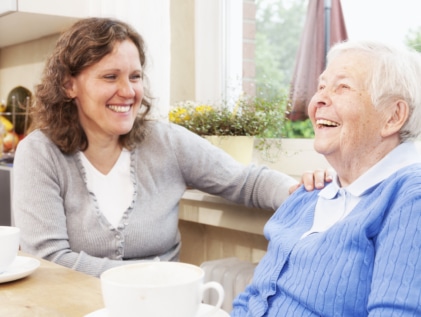Although many Americans over the age of 18, approximately 44 million, are providing care for an elderly parent or family member, the work can leave one feeling lonely, isolated, and mentally and physically worn down. Studies show that most caregivers are ill-prepared to take on this role and have minimal support within their community or from loved ones. It should come as no surprise, then, that 70% of caregivers exhibit symptoms of depression, 11% experience a decline in their physical health, and more than half report worse eating and exercise habits after becoming caregivers.
It is critical, then, for caregivers to make connections and feel supported by others in similar situations. But how does one find the time to attend a support group while juggling the demands of professional, personal, and familial responsibilities? Getting online is a great alternative and offers a safe space to vent and ask questions to a large community of caregivers. Plus, you can join from anywhere and at any time. We’ve researched and compiled a list of the top caregiver support sites:
Caregivers can find hundreds of support groups, and many that are very specific, directly on Facebook. Spouses of those living with dementia may gravitate towards the group “Caring for spouse with Dementia,” while female caregivers working full-time jobs may like the group “Working Daughter.” The group “Caregivers Connect,” with over 4,500 members, is more general and is open to anyone caring for a parent, spouse, or loved one. Start with a quick search on Facebook to find a group that fits your needs and situation.
Watching a parent transition from caregiver to care receiver is never easy, and making this transition involves numerous considerations. How do you know when to seek care? And what can you do to help your parent access the right resources at the right time to remain as independent as possible? Our comprehensive caregiver checklist will help you navigate every step of the way. Download your copy today →

Caring for you as you care for family is the motto for the website CareGiving.com. The site hosts a wide variety of chat groups, contains resources such as blogs, webinars, videos, and podcasts, and even offers educational courses. They also host an annual national caregiving conference that can be attended either in person or virtually.
Family Caregiver Alliance aims to improve the quality of life for caregivers and the recipients of their care and hosts a plethora of resources. FCA also offers an online support group, caregiver education, and resources specific to each state. They’ve recently introduced the FCA Learning Center, an online community providing information, training, and classes.
Search the websites of organizations dedicated to specific illnesses and ailments. For example, if your loved one is living with Alzheimer’s, the Alzheimer Association hosts a free online support group called ALZConnected. For those affected by cancer, CancerCare provides free online support services and research for caregivers.
As you journey through caregiving, remember the Buddhist principle that you must take of yourself before you can take care of others. If you’re struggling to make connections or experiencing symptoms of isolation and depression, reach out to your physician for guidance.

